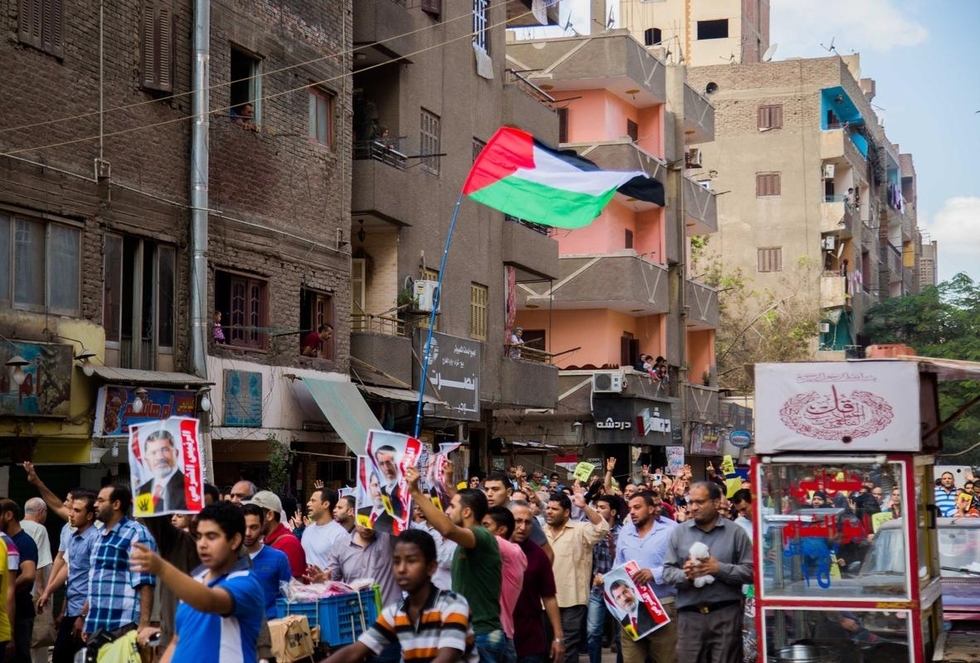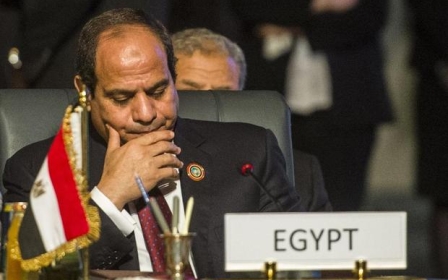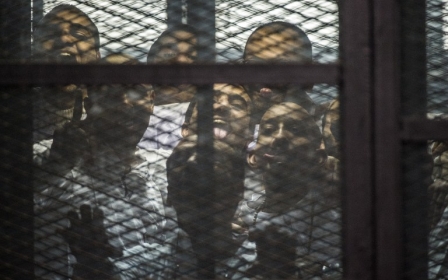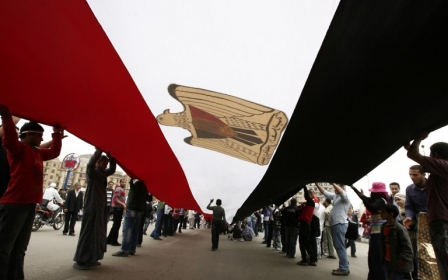Sisi’s foreign policy: A ‘miracle’ for Israel but a disaster for Palestine

On 29 October 2015, Egypt was one of the countries that voted Israel onto the UN Committee on the Peaceful Uses of Outer Space Affairs (UNOOSA). In the face of fierce domestic and Arab criticism, Egypt claimed that voting separately for a number of Arab countries to secure membership of the committee was not possible, and hence Israel had to be included in the vote.
However, 11 Arab countries abstained from voting in protest at Israel’s appointment, stating that the country’s fierce violations of international law and continuous dispossession and occupation of Palestinian land should bar it from inclusion to any of the UN’s bodies.
But Egypt’s calculations seemed different amidst its new and accelerating policy of further marginalising its Palestinian neighbour; it therefore decided to vote at the UN in favour of Israel for the first time since the country's creation in 1948. Such assistance must be what the Israeli Ministry of Defence rightfully referred to as a “miracle” for the state of Israel, when Abdel Fattah al-Sisi came to power in 2013 after he toppled president Morsi.
Strangling Gaza
Ever since, Egypt’s foreign policy towards Israel has been one of retreating further from the Palestinian cause by servicing Israel in its need to isolate and decompose the Palestinian national body. It is clear that al-Sisi’s strangling of the Gaza Strip on its eastern borders is in full coordination with the Palestinian Authority and Israel, while Cairo failed heavily in explicitly condemning Israel’s judaisation of East Jerusalem, the targeted killings of more than 70 Palestinians and the detention of more than 1500 Palestinians in the past three weeks, and the continuous mushrooming of settlements in the West Bank.
Shifting away from the demands of the 2011 January revolution regarding a just solution for a Palestinian state and a revision of the Egyptian-Israeli Camp David Accords, the Sisi regime has been stepping up Mubarak-era strategies by emphasising that Israel’s security is a national priority of Egypt’s foreign policy, one that favours disunity and fragmentation among the Palestinian parties.
In order to maintain this discourse, the Sinai Peninsula had to be converted into the theatre of continuous operations under the umbrella of the fight against terrorism, a narrative similar to Israel’s.
Although the insurgent groups based in the Sinai Peninsula, a product of decades of exclusion from the Egyptian socioeconomic fabric, increased their attacks against the Egyptian army after its military coup in July 2013, it appears nonetheless that Egypt’s security interest is intensely focused toward tightening the siege on the Gaza Strip.
The Hamas government that internally rules the Strip is perceived by Egypt as an extension of the Muslim Brotherhood, a group classified as terrorist in Egypt, and was the appropriate scapegoat to consolidate Israeli-Egyptian relations at the expense of nearly 2 million besieged Palestinians.
Fighting - or inciting - terrorism
Al-Sisi, supported by state and private media in his country [link], blamed part of the escalating violence in the Sinai on Palestinians, rather than on his own internal policies, which have been the most repressive – not to say criminal - in his attempts to reassert the military’s iron grip on public space. Luckily, he found in Israel a willing ally in his fight against “Islamic terrorism,” one that revolved mainly along the Egyptian-Palestinian border.
According to a Human Rights Watch report, from July 2013 to August 2015, at least 3,255 homes, community buildings and offices in the Sinai Peninsula along the border with the Gaza Strip have been destroyed by the Egyptian forces. The army has forcefully evicted and displaced families as part of a long-considered plan to establish a “buffer zone” with the Gaza Strip.
The buffer zone was justified as part of a policy to break down the smuggling tunnels that would allow fighters and weapons to be transferred from Gaza to the Sinai, a claim never proved. Egypt is currently pumping water into the tunnels and constructing a 20-metre-deep trench filled with seawater to further starve the besieged Palestinians of goods and foodstuffs. Al-Sisi’s services have been exceptionally rewarded by Israel as it allowed Egyptian tanks, combat helicopters and F-16 fighter jets into the Sinai Peninsula, a privilege never granted to Sadat and Mubarak, as the effective demilitarisation of the peninsula was part of the peace treaty between the two countries signed in 1979.
Additionally the Israeli Tamar partners signed a $1.2 billion deal with Egyptian company Dolphinus in March 2015 to supply gas to Egypt from Israel's large offshore field as a move to improve geopolitical and economic linkages. It seems that Israel has found a new partner in its fight against “terrorism,” the Iranian nuclear project and the Palestinians, the three main strategic threats Israel claims to be facing.
Confused regional policy
Nevertheless, Egypt’s role as a key regional player has been declining with the rise of other Arab countries such as Saudi Arabia, which are taking the lead in regional crises in Yemen and Syria. Since his coup, al-Sisi turned Egypt's foreign policy into a confused reactive policy, which seems unable to take a firm stand regarding a military intervention in Yemen, and one that seems shaky towards the Syrian regime, claiming that it too is facing terrorist groups and has the right to use extensive power to fight insurgents.
Following this disorientated foreign policy in a region that is facing the collapse and transformation of the traditional borders and power equations, al-Sisi is unable to stabilise his fragile domestic environment while oppressing the demands of the 2011 January revolution, nor to stem the violent transformation of the Sinai. It therefore seemed more comfortable to return to Egypt’s familiar Mubarak-era policies, which worked on concentrating Egyptian foreign policy on the security of Israel. Accordingly he pulled the traditional “Israel” card in front of his American and European allies, emphasising that Egypt is vital to Western interests.
To express his sincerity, al-Sisi recently called for expanding the 40-year-old peace process between Egypt and Israel to include more Arab countries at the UN General Assembly. He stressed the need to address the worsening threat of terrorism in the Arab region and the importance of Egypt’s military as a “stabilising factor”.
Egypt’s dictatorship is bowing to Israel and the US at the peril of average Egyptians and Palestinians. And despite Egypt's rapprochement with Russia, Obama maintained the yearly $1.3 billion in aid to Egypt's military, which is failing to secure stability in and outside its borders.
Despite all these guarantees to Israel, al-Sisi will most likely fail in keeping his authoritarian regime in a shifting Arab region. This iron grip approach, which led to the murder and imprisonment of tens of thousands of Egyptians, is not sustainable; if no real reforms take place in Egypt, al-Sisi will not only destabilise his country, but drag Palestine along too.
- Hanine Hassan is a Teaching Fellow of Middle Eastern, South Asian, and African Studies (MESAAS) department at Columbia University Twitter: @hanine09
The views expressed in this article belong to the author and do not necessarily reflect the editorial policy of Middle East Eye.
Photo: Egyptians shout slogans and hold banners as they stage a demonstration against the Sisi government and demand the release of friends detained by security forces, in Haram neighborhood of Giza, Egypt on 30 October, 2015. (AA)
New MEE newsletter: Jerusalem Dispatch
Sign up to get the latest insights and analysis on Israel-Palestine, alongside Turkey Unpacked and other MEE newsletters
Middle East Eye delivers independent and unrivalled coverage and analysis of the Middle East, North Africa and beyond. To learn more about republishing this content and the associated fees, please fill out this form. More about MEE can be found here.





